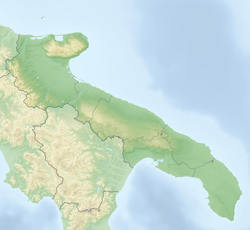Calcare di Bari
| Calcare di Bari | |
|---|---|
| Stratigraphic range: Valanginian-early Turonian ~ | |
| Type | Geological formation |
| Sub-units | Avvantaggio, Montericco, Palorbitoline, Corato, Bisceglie & Sannicandro Members |
| Underlies | Calcare di Altamura |
| Overlies | not observed |
| Area | 100 km2 (39 sq mi) |
| Thickness | Up to 2,000 m (6,600 ft) |
| Lithology | |
| Primary | Limestone |
| Other | Dolomite |
| Location | |
| Coordinates | 41°12′N 16°30′E / 41.2°N 16.5°E |
| Approximate paleocoordinates | 24°18′N 20°18′E / 24.3°N 20.3°E |
| Region | Apulia |
| Country | |
| Extent | Apulian Platform |
| Type section | |
| Named for | Bari |
| Named by | Valduga |
| Location | Petraro Quarry |
| Year defined | 1965 |
| Coordinates | 41°17′13″N 16°17′08″E / 41.2869°N 16.2855°E |
| Region | Apulia |
The Calcare di Bari (Italian for Bari Limestone) is a Cretaceous (Valanginian to early Turonian, spanning approximately 45 million years) geologic formation in Apulia, southeastern Italy.[1] The formation comprises micritic limestones, in places karstified and dolomitized. Rudists and fossil ankylosaur, sauropod and theropod tracks have been reported from the 2,000 metres (6,600 ft) thick formation that was deposited in an inner carbonate platform environment towards the top dominated by rudist reefs.
Description[edit]
The Calcare di Bari underlies the Calcare di Altamura, separated by an unconformity. The base of the formation is not recognized in outcrop.[2][3] The Calcare di Bari is subdivided into the Avvantaggio, Montericco, Palorbitoline, Corato, Bisceglie and Sannicandro Members.[2] The formation crops out around the Bari–Taranto railway.[4]
The formation comprises micritic and dolomitic limestones containing foraminifera with several levels of rudists. The depositional environment of the formation has been interpreted as inner platform with tidal and lagoonal influence. The formation crops out across an area of about 100 square kilometres (39 sq mi),[2] and the total thickness has been estimated at 2,000 metres (6,600 ft).[3][5]
From the Valanginian to the early Aptian the present region of Apulia was dominated by a very shallow carbonate platform characterized by tranquil waters, evidenced by the muddy to marly limestones. Deepening occurred in the upper part of the formation with subtidal deposits containing a rudist reefal fauna.[3]
The upper part of the formation is dated to the Cenomanian based on the presence of the microfossils Sauvagesia sharpei, Chrysalidina gradata, Pseudolituonella reicheli, Pseudorhapydionina dubia, Nummofallotia apula, Nezzazata sp. and algae Heteroporella lepina.[6] The uppermost part is dated to the early Turonian.[2]
Fossil content[edit]
The formation has provided ichnofossils of:[1]
- Foraminifera
See also[edit]
References[edit]
Bibliography[edit]
- Leonardi, G. 2008. Vertebrate ichnology in Italy. Studi Trentini di Scienze Naturali, Acta Geologica 83. 213–221. .
- Reina, Alessandro, and Buttiglione Luigi. 2005. Tecniche geologiche tradizionali nella ricerca di nuovi giacimenti di pietre ornamentali in Puglia. Geologi e Territorio 1/2. 29–40. .
- N., N. 2001. Carta Geologica d'Italia 1:50.000 - Catalogo delle Formazioni, 31–55. APAT - Dip. Scienze della Terra, Università di Firenze - Commissione Italiana di Stratigrafia.
- Geologic formations of Italy
- Cretaceous System of Europe
- Cretaceous Italy
- Valanginian Stage
- Hauterivian Stage
- Barremian Stage
- Aptian Stage
- Albian Stage
- Cenomanian Stage
- Turonian Stage
- Limestone formations
- Dolomite formations
- Shallow marine deposits
- Reef deposits
- Ichnofossiliferous formations
- Paleontology in Italy
- Geography of Apulia


